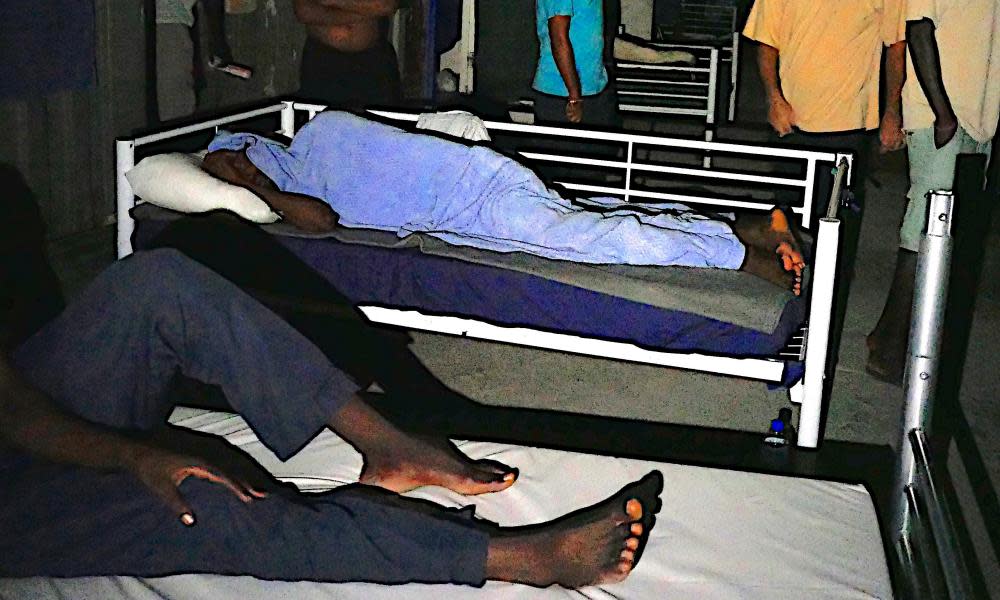Twelve former Australians of the Year condemn government and urge action on Manus

Twelve former Australians of the Year have condemned the actions of the Australian government on Manus Island, as Papua New Guinean police and immigration officers entered the detention centre on Thursday morning, demanding that detainees leave.
The open letter, signed by Australians of the Year between 1983 and 2015, pleaded with the Australian government to restore essential services and allow doctors to treat the 380 men who remain inside the centre.
The situation inside the centre is deteriorating, and the letter warned it was “inevitable” that people would become sick and even die because of the lack of food and water, medical care and sanitation.
“This treatment does not represent who we are as Australians, or indeed as human beings,” said the open letter, signed by former honorees including Rosie Batty, Ita Buttrose, Patrick McGorry, Tim Flannery and Mick Dodson.
“We plead with you to immediately restore all essential services to the men on Manus Island. Please allow the Australian Medical Association to provide medical and preventive care, as they have recently offered, as soon as possible. At the same time please find safe haven for the acknowledged genuine refugees without any further delay.”
The letter also expressed concern about Australia’s international reputation on human rights. It said responsibility for the situation lay with Australia, not Papua New Guinea.
“It seems our major political parties have failed to meet the most basic obligations under the United Nations refugee convention, one that our country helped to negotiate and which we signed in 1951.”
One of the signatories, Simon McKeon, the chancellor of Monash University and former chair of AMP, said getting Australians of the Year together on an issue was a “once-in-a-blue-moon sort of thing” but they all felt strongly about the Manus crisis.
“At the end of the day my own view is that in the circles I move we well understand the reasons why governments and oppositions over a period of time have been so focused on the deterrent aspect of what we’ve done on Nauru and Manus Island,” he told Guardian Australia. “But time has gone on.”
McKeon said observing the deterrence policy over the years had left him with an understanding of it even if he didn’t fully accept it, but he was “now challenging whether that particular argument is justifying what is going at the moment, and entitling us to receive the international criticism we’re plainly getting at the moment”.
“For my part I don’t see any rational argument anymore that says not doing what the AMA is [calling for] is in any way consistent with the deterrent argument. There’s a complete disconnect there.”
The crisis at the former immigration detention centre is entering its fourth week, as human rights groups and foreign governments voice concern and outrage at the deteriorating situation.
On Wednesday PNG police said they would await the outcome of a legal appeal before conducting “Operation Helpim Friends”, which would “politely” ask the detainees to leave voluntarily. The police commissioner, Gari Baki, said no force would be used. But he added that the notorious paramilitary mobile squad would be on hand to assist.
Behrouz Boochani, a journalist and refugee inside the centre, said on Thursday the mobile squad and immigration officers had come into the camp and were “shouting at us to leave”.
He said refugees were gathering together in one compound and some had climbed on the roof.
So many police mobile squad and immigration officers came inside the prison camp. They are shouting at us to leave the prison camp. Some of the refugees are gathering in Delta compound and some are on the roof.
— Behrouz Boochani (@BehrouzBoochani) November 22, 2017
Too much tension in Delta compound. Hundreds of refugees gathering in Delta right now. An Australian Federal Police officer is guiding PNG police mobile squad, there are about 50 mobile squad police that are threatening people to leave.
— Behrouz Boochani (@BehrouzBoochani) November 22, 2017
Officers “in large numbers” were demanding the men hand over phones and stop recording their activities.
The men have said they fear for their safety in the Lorengau community, and organisations including the UN high commissioner for refugees have said the accommodation built for them is not ready or secure enough. Authorities are preventing food, water and medical care from getting to them.
In the past few weeks there have been break-ins and protests at the alternative accommodation sites, and medical emergencies inside the centre.
Immigration and police started searching the rooms and are saying "Move Move", you only have an hour to move. Too much stress and tension here in Delta. Some refugees are crying.
— Behrouz Boochani (@BehrouzBoochani) November 22, 2017
Last week members of the Australian Medical Association voted unanimously to call on the government to allow doctors access to the centre, to assess the men’s health and living conditions.
“The AMA has made many representations on this matter, both publicly and in private but, with a worsening and more dangerous situation emerging on Manus, the federal council strongly believes that urgent action and answers are needed,” said the AMA president, Michael Gannon.
On Wednesday the UNHCR said the humanitarian crisis was human-made and entirely preventable. It was a “damning indictment of a policy meant to avoid Australia’s international obligations”, said Nai Jit Lam, the UNHCR’s deputy regional representative in Canberra.
The Australian government has remained resolute in its policy, dismissing criticism and rejecting offers of help, including from New Zealand to take 150 refugees and to separately provide $2.7m to PNG to provide essential services.
It has also warned New Zealand against making any deals with PNG without Australia, suggesting that would affect diplomatic relations.

 Yahoo News
Yahoo News 
